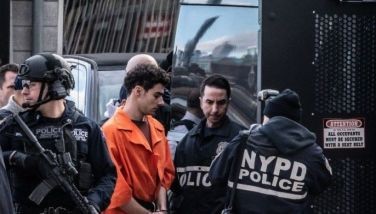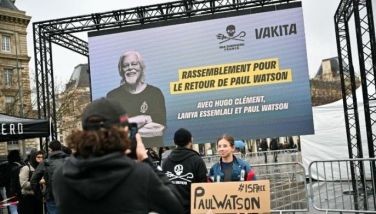Obama gets glimpse of life as lame duck abroad
BRISBANE — President Barack Obama is getting his first glimpse of life as a lame-duck president traveling overseas. And so far, he has reason to like what he sees.
Obama arrived in the Asia-Pacific region weakened by a cascade of crises that have put him on the defensive for much of this year, and politically damaged by Democrats' thrashing in last week's midterm elections. But during stops in China and Myanmar, there were few overt signs that Obama's troubles at home had followed him abroad.
Instead, Obama secured unexpected agreements with China on climate change, military cooperation and trade. And in Myanmar on Friday, Obama received a full-throated endorsement of his commitment to the country's democratization from revered opposition leader Aung San Suu Kyi and was enthusiastically greeted by young people at a town hall in the bustling commercial capital of Yangon.
"You're always popular in somebody else's country," the president told the cheering youth. "When you're in your own country, everybody is complaining."
From Myanmar, Obama flew to Brisbane, Australia, where he arrived yesterday for the Group of 20 economic summit.
For a beleaguered White House, the trip has been a welcome relief from criticism and crisis in Washington, as well as a reminder of the opportunities that could still exist in the president's final two years in office.
In turning overseas so quickly after the midterms, Obama is following a path well-trodden by his predecessors. For second term presidents who, like Obama, find themselves with diminished political and popular appeal, the world stage can look like a welcoming place.
To be sure, Obama has signaled in the week and a half since the midterm elections that he doesn't intend to just quietly jet off to overseas capitals and immerse himself in foreign affairs. He has jumped into the fray over net neutrality by unveiling his plan for a "free and open" Internet. White House officials are putting final touches on a package of immigration executive orders that have Republicans outraged. And Obama is holding his ground in the fight over the Keystone XL oil pipeline and appears to be readying for a veto of congressional legislation that seeks to force construction of the project.
Still, Obama this week has clearly relished being able to focus on one of his foreign policy priorities: an expansion of US engagement in the Asia-Pacific region, which he hopes becomes a central part of his legacy. While Obama has often been criticized for letting his so-called pivot to Asia languish amid more urgent matters, his trip this week has suggested he still could breathe new life into that effort.
Obama's stop in China proved to be surprisingly fruitful. He and President Xi Jinping unveiled an ambitious joint plan to reduce greenhouse gas emissions, an agreement that was the product of months of secret negotiations between Washington and Beijing. The two leaders also announced deals to increase military cooperation and extend the lengths of visas given to each other's citizens.
In Myanmar, which is also known as Burma, leaders repeatedly thanked Obama for being a willing partner as the country emerges from a half-century of military rule. And Suu Kyi, the country's democracy icon, quickly put to rest rumors of a rift with Obama, her fellow Nobel Peace Prize laureate.
"We may view things differently from time to time but that will in no way affect our relationship," said Suu Kyi, who warmly embraced Obama during their joint news conference.
Still, Obama's ability to focus on the reset with Asia also laid bare the unevenness of that effort six years into his presidency. Even as Obama and Xi highlighted areas of agreement, there was little progress on the drivers of tension between their nations, including human rights, cybersecurity, and China's actions in maritime disputes with its neighbors. Some leaders in Beijing remain deeply skeptical about Obama's outreach in the region, seeing it as an effort to contain China's rise.
And Obama did little to quell critics of his Myanmar policy who say his desire to make the country's democratization part of his legacy has clouded his ability to clearly see the shortcomings of that process. While he was blunt in his calls for Myanmar to swiftly enact constitutional reforms and end persecution of minorities, the president publicly outlined few consequences if those steps don't occur.
"Consequences are the key, not words," said John Sifton, the Asia advocacy director at Human Rights Watch and a tough critic of the administration's Myanmar policy. "Incentives and disincentives must be communicated as often as possible, including in public."
Obama was due to arrive back in Washington Sunday night, where the reception from congressional Republicans may not be as warm as those he received overseas.
- Latest
- Trending



























